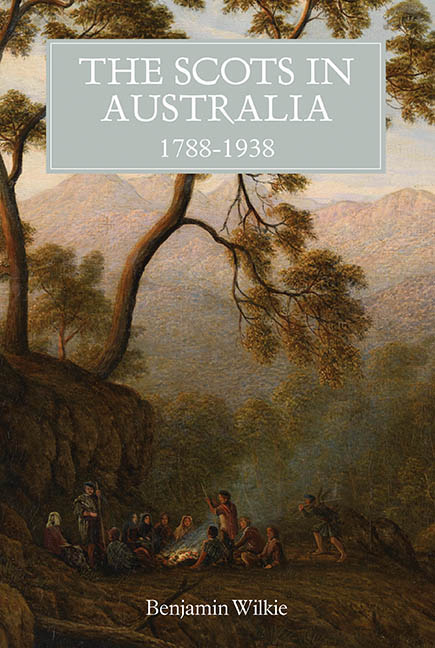Book contents
- Frontmatter
- Contents
- Illustrations
- Acknowledgements
- Abbreviations
- Introduction
- 1 From Scotland to Australia: Convicts, Free Settlers, and Encounters with Australia
- 2 Caledonia Australis: Imperial Commerce, Migrant Networks, and Australian Pastoralism
- 3 Scottish Migrants and Indigenous Australians
- 4 Imagining Home: Scottish Culture in Australia
- 5 Warriors of Empire: A Case Study of Popular Imperialism
- 6 The Empire Builders: Imperial Commerce and Migration between the Wars
- 7 New Scots: Industry, Settlement, and Working-Class Migration
- 8 At The Edge of Scotland's Diaspora: Diversity and Tension in the Twentieth Century
- Conclusion: The Imperial Legacy
- Bibliography
- Index
8 - At The Edge of Scotland's Diaspora: Diversity and Tension in the Twentieth Century
Published online by Cambridge University Press: 23 August 2019
- Frontmatter
- Contents
- Illustrations
- Acknowledgements
- Abbreviations
- Introduction
- 1 From Scotland to Australia: Convicts, Free Settlers, and Encounters with Australia
- 2 Caledonia Australis: Imperial Commerce, Migrant Networks, and Australian Pastoralism
- 3 Scottish Migrants and Indigenous Australians
- 4 Imagining Home: Scottish Culture in Australia
- 5 Warriors of Empire: A Case Study of Popular Imperialism
- 6 The Empire Builders: Imperial Commerce and Migration between the Wars
- 7 New Scots: Industry, Settlement, and Working-Class Migration
- 8 At The Edge of Scotland's Diaspora: Diversity and Tension in the Twentieth Century
- Conclusion: The Imperial Legacy
- Bibliography
- Index
Summary
By the early twentieth century, the Scottish diaspora in Australia was marked by a social, political, and cultural diversity that mainstream Australian ideas about Scottish identity, culture, and character did not fully encompass. The way in which some of the new arrivals were received in Australia places the boundaries of the Scottish diaspora into sharp focus. While many nineteenth-century Scottish migrants to Australia drew upon an imperial tradition to make sense of their iden¬tities and to construct a diasporic culture, by the eve of the Second World War the Empire had become less important to Scotland. Migrants from Scotland brought with them increasingly divergent ideas about what it meant to be Scottish, and what was meant by ‘Scotland’.
The foundations of Scotland's identity and culture before 1914 were imperial and focused on militarism, economic expansionism, the missionary ethic, and the role of Scots abroad, and the middle class largely constructed this identity – and exported it overseas. The impact of the war and its aftermath tested these foun¬dations in several ways. The Reform Act of 1918 almost doubled the voting popu¬lation of Scotland and enfranchised working-class men and women over the ages of 31. The Labour Party slowly supplanted the Liberal Party, politics progressively became dominated by class interests, and attention shifted to domestic conditions in Scotland. Interwar Scotland experienced traumatic social, economic, cultural, and political dislocation that caused the Scottish imperial identity to deterio¬rate into a state of crisis. For many in Scottish society, the Empire had become almost irrelevant. Those committed to imperial visions of Scottish national identity struggled to adapt these notions to the new circumstances of postwar Scotland; although, Empire-building Scots would limp through the Second World War and their favourite image of imperial Scotland – the Highland regiment – would linger well into the twenty-first century.
Replacing popular imperialism was a new vision of politics. From the middle of the nineteenth century, working-class campaigns for Scottish self-government and sympathy for the ideals of international socialism developed in parallel, and the subordinate role of Scotland as an internal British colony was a common theme in leftwing discourses. In the aftermath of the First World War, British patriotism in Scotland was in decline, and in the period from 1919 to the mid-1930s the nation's political sphere was coloured by a complicated mix of nationalism and socialism, throughout which the latter seemed to have dominated political life.
- Type
- Chapter
- Information
- The Scots in Australia, 1788–1938 , pp. 139 - 158Publisher: Boydell & BrewerPrint publication year: 2017

